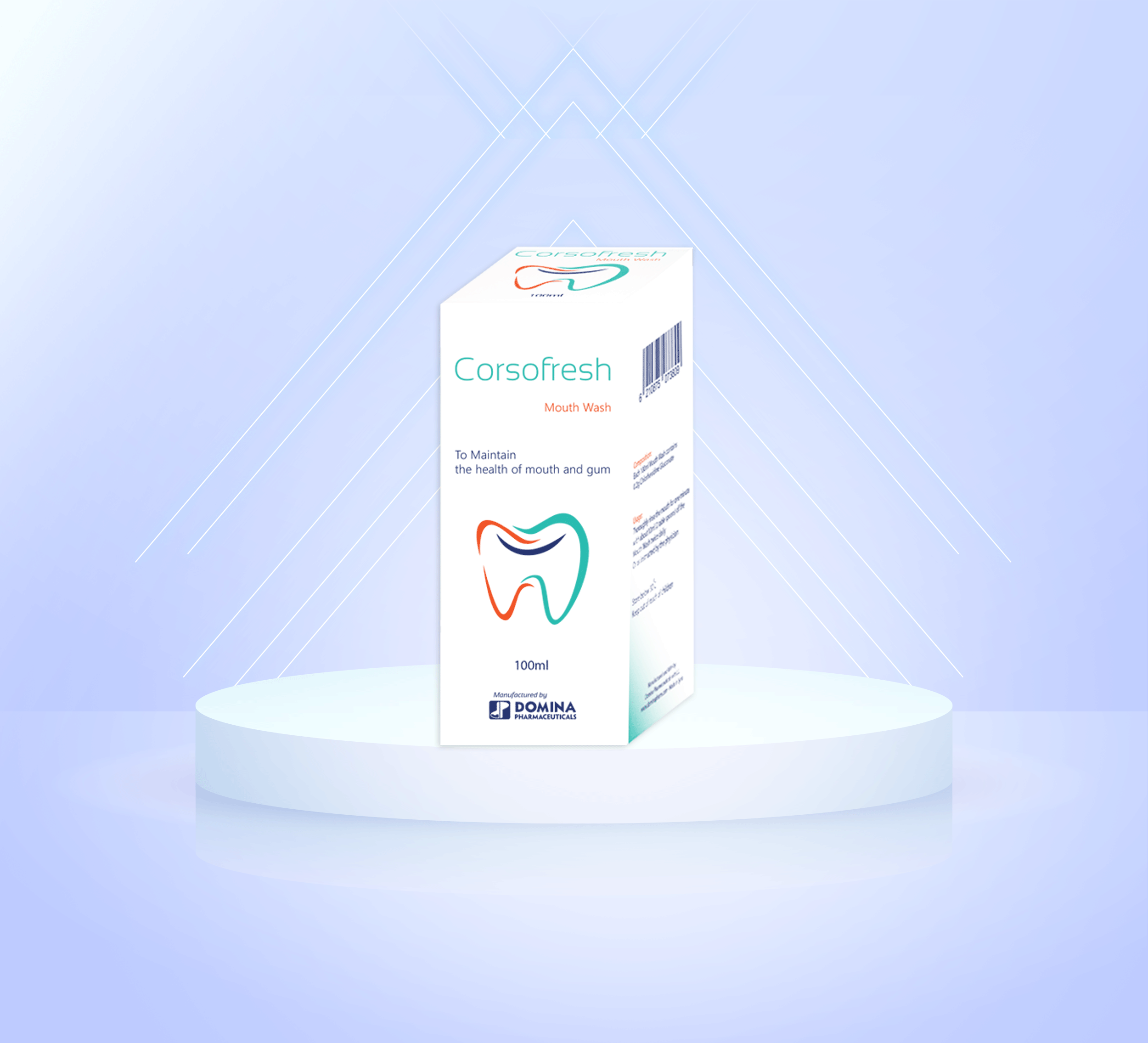
Composition:
Each 100ml Corsofresh Mouthwash contains 0.2g Chlorhexidine Gluconate (0.2% w/v).
Mechanism of action:
It is effective against a wide range of gram negative and gram positive bacteria, yeasts, dermatophyte fungi and lipophilic viruses.
Chlorhexidine is active against a wide range of important oral pathogens and is therefore effective in the treatment of many common dental conditions.
Pharmacokinetics:
Because of its cationic nature, chlorhexidine bonds strongly to skin, mucosa and other tissues and is thus very poorly absorbed.
Indications:
Chlorhexidine used for:
- Inhibition of formation of dental plaque.
- As an aid in the treatment and prevention of gingivitis.
- As an aid to maintaining oral hygiene particularly in situations where tooth brushing cannot be adequately employed (e.g. following oral surgery, in mentally or physically handicapped patients).
- For use in a post-peridontal surgery or treatment regimen to promote gingival healing.
- It is useful in the management of recurrent aphthous ulceration.
- It is useful in the management of oral candidal infections (e.g. denture stomatitis and thrush).
- As an aid in the prevention of dental caries in high-caries-risk patients (for example xerostomia sufferers), when used in a regimen as an adjunct to fluoride.
Usage:
Mouthwash:
Adults:
- Thoroughly rinse the mouth for about one minute with 10 ml twice daily. In the dental surgery the patient should be instructed to rinse the mouth for one minute prior to treatment.
- For the treatment of gingivitis a course of about one month is advisable.
- In the case of aphthous ulceration and oral candidal infections treatment should be continued for 48 hours after clinical resolution.
- For the treatment of dental stomatitis the dentures should be cleansed and soaked in Corsofresh for fifteen minutes twice daily.
Children and the Elderly:
- The normal adult dose is appropriate for elderly patients and children of 12 years and over unless otherwise recommended by the dentist or the physician.
- Children under 12 years of age should not use the product unless recommended by a healthcare professional..
Side effects:
Common: dry mouth, oral paraesthesia, hypoaesthesia, discoloration of the teeth and tongue,
irritation of the mouth, swelling of oral mucosa, parotid gland swelling, hypersensitivity and anaphylaxis.
Contraindications:
hypersensitivity to Chlorhexidine or to any of the excipients.
Drugs Interactions:
Chlorhexidine is incompatible with anionic agents.
Precautions:
For oral use only. do not swallow. Keep out of the eyes and ears.
- Self-life of Corsofresh after opening is 3 months for mouthwash and 1 month for dental gel.
- For oromucosal use only. Do not swallow.
- Keep out of the eyes and ears. If the gel comes into contact with the eyes, wash out promptly and thoroughly with water.
- In case of soreness, swelling or irritation of the mouth, stop using the product and consult a healthcare professional.
- Corsofresh is incompatible with anionic agents which are usually present in conventional dentifrices. These should therefore be used before Corsofresh (rinsing the mouth between applications) or at a different time of day.
- In case of swelling or difficulty breathing, stop using the product and seek immediate medical help.
- Macrogolgylcerol hydroxystearate may cause skin reactions.
Use in pregnancy or lactation:
There is no evidence of any adverse effects on the foetus arising from the use of Corsofresh during pregnancy or on infants during lactation. Therefore, no special precautions are recommended.